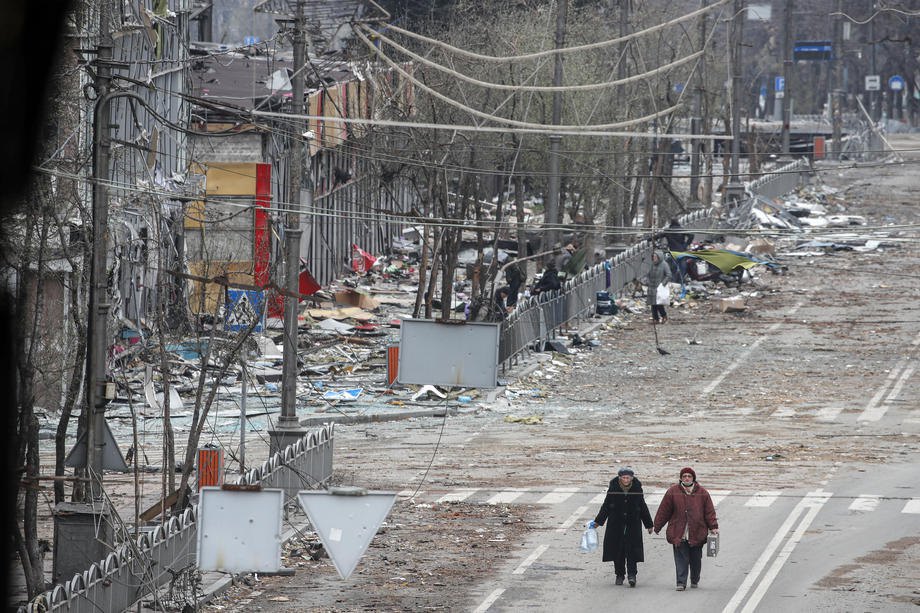
Karyna and Yulia [names changed - LB.ua] are two ordinary Ukrainian women who have worked together in one company for 28 years. They were able to get out of the blocked city.
Karyna is 57 and has lived in the Central District of Mariupol for 40 years. Now only ruins remain there. Her friend, 49-year-old Yulia, comes from the village of Sartana, a suburb of Mariupol, where she lived all her life.
These courageous women survived the bombing, famine, street fighting, and death of close relatives and friends. They saw with their own eyes how their lives were burned in the fire and buried under the rubble of city quarters by russian artillery and air bombs.
Karyna and Yulia told LB.ua the story of their rescue from the hero city of Mariupol.
The first shock
Karyna: At 02:44 on February 24, Yulia sent me an SMS. Its text was as follows: “Karyna, they are shooting so f*cking hard. We woke up and started praying. They are shelling towards us and from us heavily. I don’t even know how to go to work.”
I woke up at about half-past four. At 04:53, I answered her: “Well, I don’t hear anything.” And a few minutes after, the car alarms went on after the shock wave. She asked Yulia what she had there.
Oleksiy [Karyna’s son - LB.ua] called me at five o’clock – he lives in Kyiv. I’m very afraid of such calls - we usually call each other at a specific time. So when I saw the incoming call from him on my phone, I realized that something was wrong.
He said: “Putin attacked us. Forget about going to work - prepare an alarming suitcase.” But I still decided to go to work. There was no panic on the street. The only thing was that people ran to ATMs to withdraw money. We had a similar experience in 2014-2015. Back then, after [missile] arrivals, communal workers quickly repaired damaged houses and replaced windows. Everyone thought this time it would be the same.

I was one of the first who came to the office. Then colleagues came - two girls. They had small children at home. Okay, I am an old woman, but why should they be sitting here if the war had started?
I asked the management: “What should we do?” – “Work!” they told.
And how to work in such a situation? I walked around the office and could not find a place. A missile arrived somewhere in the city. In our office, the windows swayed - they were so big, panoramic: if they were hit, we would all be under the glass. And why do I need such f*cking work? I called the chief: “The war has started. Some mothers have left their children at home; our windows tremble when shells fall in the city.” Our chief replied to me cynically: “Then scotch the windows.”
However, after the conversation, the chief ordered the computers to be placed under the table so that the wreckage would not damage them and allowed us to go home but asked that somebody stay on duty. “No one stays on duty,” I told him. I waited for Yulia, and we left.
We came to my place and lay down on the couch, holding hands. She told me, “When I wrote you that text, I thought it would be my last one.” Explosions became more frequent. We started to panic. The next day Yulia went home to Sartan.
The hell started in Sartan
Karyna: In the first two days, we had a connection with Yulia, but then it disappeared. I moved my parents to my place. We already heard explosions nearby. Colleagues wrote in our working chat in Viber that Sartana was bombed. That destroyed houses on Pivnichna Street. And there Oleksiy’s grandmother - his father’s mom – lived. I was told that his grandmother and my son’s aunt were injured, and his 26-year-old cousin Ivan died from a falling ceiling - he could not reach the basement in time. Ivan’s mother, Lyudmyla, covered her grandmother because she could not walk. The grandmother was taken to a hospital in Mariupol. I do not know how she is and where she is alive now.
Back in 2015-2016, shells hit their house three times. I even remember that Radio Liberty has made a report about that.
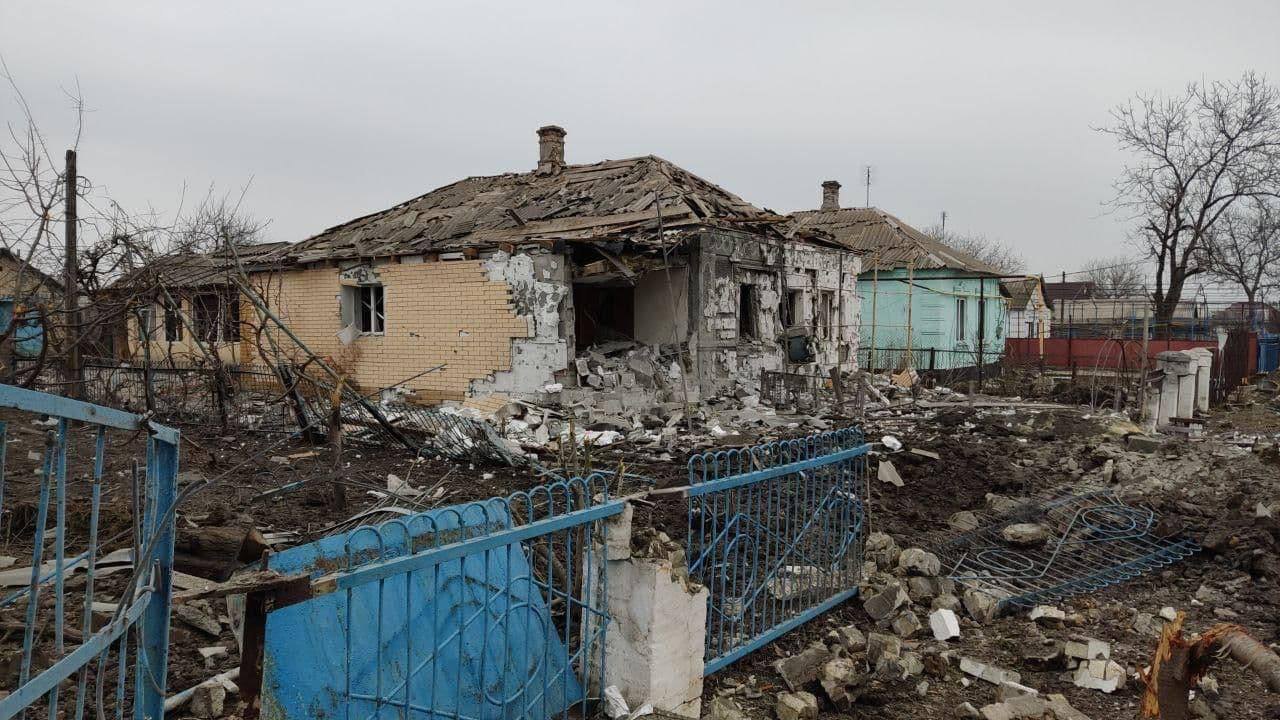
Destroyed house of Oleksiy’s grandma in Sartan.
My colleague lived nearby in Sartan, and her house was also destroyed. I offered her to come to us with the child. All this happened, and I didn’t know where Yulia was. There was no information from her.
On the eve of the war, I joined “My Sartana” Viber group. I wrote an address there asking if anybody knew anything about Yulia? But no one answered. So I continued writing over the next two days until the news came: Yulia’s street was destroyed - there were almost no houses left. It was the third day of the war.
Yulia: In February, I was sick in the hospital. I was discharged on the 23rd and went home to Sartan. I still felt very bad, and because of this, I could not understand what was happening.
When we heard the first flight of the aircraft, we thought that they were just passing us. We thought they were photographing the area. And when we realized that the russians had come to bomb us, we were shocked. The first missile arrival was where Karyna’s relatives lived. The second one was near the school, where the chief accountant’s husband lived. He was torn into pieces by the explosion. On the first day, seven or eight bombs were dropped on us.
The whole family and I went into the cellar, where we spent the next three days. When a bomb fell nearby, the cellar was shaken so hard that we had to drink some spirit to calm down stress. My daughter-in-law and my mother were with us. Everyone began to tremble very much. Our great-grandmother Zina, my mother, asked her great-grandson, “Liosha, are you frozen?” And he said, “No, Zina, these all are nerves.” The child is seven years old! My other grandson, Vitya, was crying.
In addition to nerves, it was very cold. We all froze there. All the windows in the house smashed. We were lucky to have a large cellar. Then our neighbors came to us as their houses were destroyed, and they could not fit in their basements. There were 13 of us in total. So we stayed there for three days. I did not want to eat anything. I had a tank where I made wine - they made a toilet out of it. When the shelling subsided a bit, the men went outside to see what had happened to our houses.
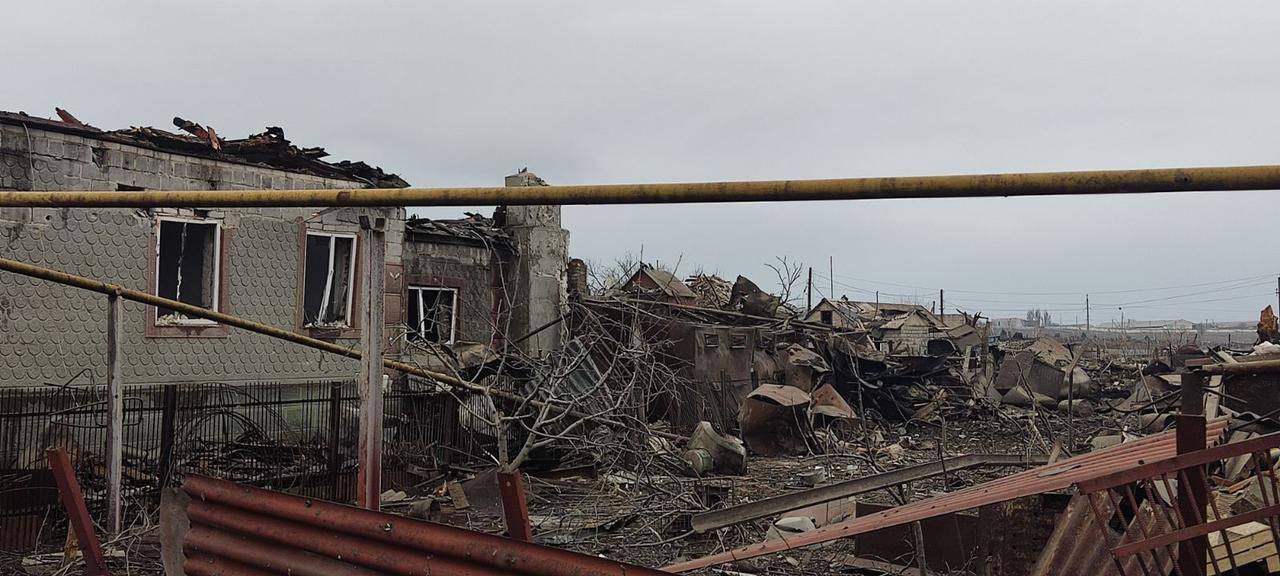
We pulled two beds in the cellar. Some were sitting, and older people and children could lie down.
The next day, the Russians bombed the gas line. Electricity has also disappeared. We had only a flashlight, which we passed to each other to eat and get corvalol [a popular sedative drug] drops. Otherwise, we sat in the dark. You get the sense of horror by its smell: the smell of gas, soot, smoke.
One of our neighbors was torn into pieces outside. Another one, Sashko, who was sitting with us, went to check on his father at night in their basement and accidentally stepped on him. He didn’t even realize initially that he was stepping on.
When I went outside, I saw a huge geyser. The projectile hit the water supply - and the pressure jet reached above the height of the houses. Luckily, my father found a spring near the house long ago, so we had access to flow water.
The phone went off very quickly. We did not know what was happening in the country. On the third day, approximately, communal workers from Mariupol arrived and began evacuating people from Sartana. They said that everything was fine in the city, hospitals were working and we had to leave.
I swept all the glass out of the yard so that my daughter-in-law and children could leave by car. I did not dare to get away for a long time. I could not leave my neighbors. When later I decided that we had to leave, my mother and I did not fit on the evacuation bus. Then I asked a neighbor to pick us up in his car. I didn’t take anything with me. I even forgot the documents. My mother went out as she was sitting in a sweatshirt, two blankets, and a jacket – she went to Karyna in all of these.
The first hit
Karyna: Yulia, her mother, and another woman from our office with a fourteen-year-old girl came to us. They were in blankets and jackets, shaking; everyone was trembling.
We still had water, electricity, and heating in Mariupol at that time. We hosted all of them. It was the last more or less quiet night for us.
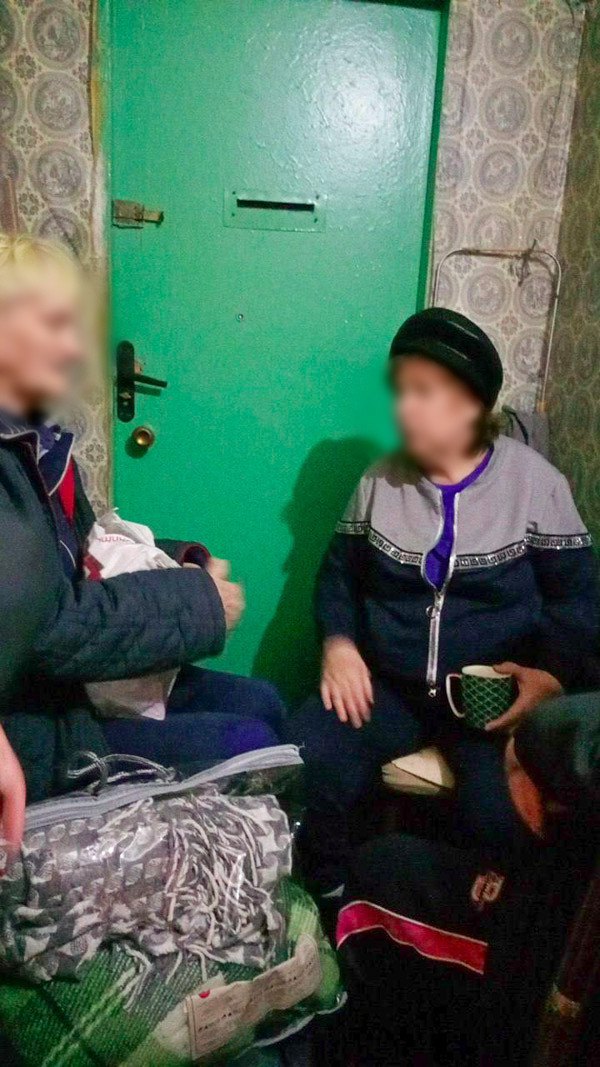
We lived in the city’s Central district, on Kirov Square [at Metallurgists Avenue and Shevchenko Boulevard intersection - LB.ua], on the ground floor, with windows to the courtyard and the road. We woke up from the sound of people with machine guns running under the windows. The shooting began. We covered windows with mattresses in one of the rooms. We closed the blinds and turned a closet to them in the other room. In the corridor, we removed the glass from the coupe closet.
We sat down in the corridor. At the time, it seemed like a safe place. Bullshit! The rule of two walls in Mariupol did not work. There was no bomb shelter in our house, just an ordinary basement. There, the head of the condominium laid linoleum and put up a few benches – that was called the bomb shelter. But it was very difficult to get to that basement, as there was a very narrow passage. The basement was much better in the next building, and people from the 8th-9th floors pulled sofas there. They had a more comfortable bomb shelter.
Fortunately, the shooting ended quickly. It was just a tank moving, and the combatants could not figure out whether it was ours or russian. But we got already pretty scared.
A colleague and her daughter went to their parents in a dormitory then: the evacuees from Sartana were housed in dormitories. Here we left, the rest of us: me, Yulia and her mother, my husband Volodymyr, and my parents.
After February 28, constant shelling and bombing began. A colleague called. Her husband worked at Silpo [supermarket]. “Go to Silpo,” she said. You can still buy bread and food there while this store still exists.”
Yulia: We went for groceries together. We bought four loaves of bread, cheese, milk, and yogurt. But there was almost nothing on the shelves. At that time, they were selling mainly in the suburbs. The central area is in the lowlands, so the explosions echoed as if nearby.

On March 1, the electricity went off, but there was still gas. We realized that there could be nothing to eat. We, therefore, made crackers, big and small, on the pan. We ate the small ones at once, and the big ones remained.
Karyna: On the same day, on March 1, the first shell hit our area. The bomb hit a high-rise building and a school – part of it has been demolished. The windows in the next building were broken. Then we went into the corridor between the apartments. We sat and prayed.
Indifference and looting
Karyna: At that time, communal services were no longer working. During the first week of the war, garbage was taken out once, and that was it. The “Kommunalnyk” enterprise was bombed, and no services were working.
In the evening of March 2 or 3, gas and heating disappeared. It was very cold in the apartment, about five degrees [Celcium] maximum. The snow in the room did not melt. We didn’t know what to do next.
My husband said: “Everything will be fine. We will cook on the grill.”
The next morning, people began to light a fire to prepare food in the yards. Yulia and I went to look for bricks to build a barbecue. We could not find them and decided to knock out a few of the brick fences near the store in our yard.
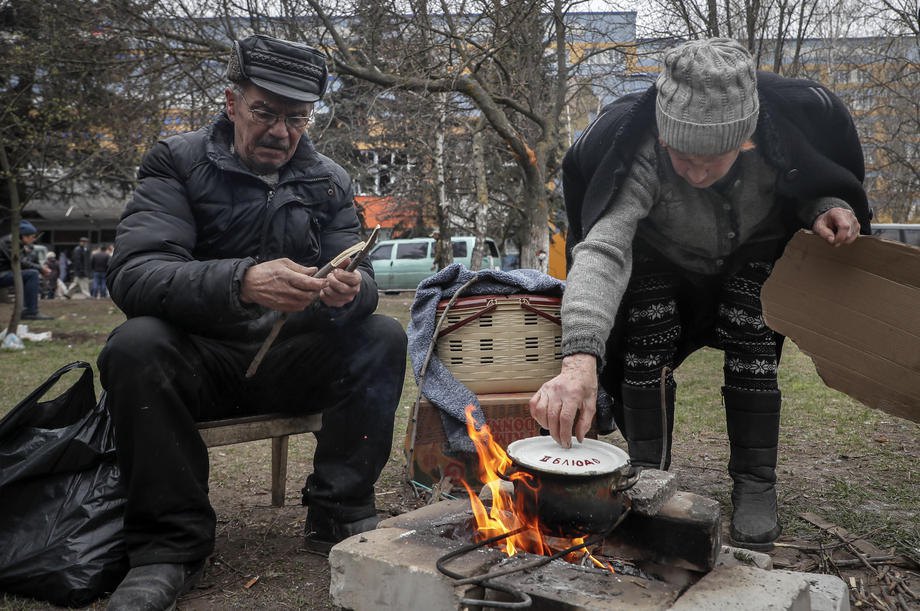
At first, we made a barbecue under the balcony, but people advised us to move it because the shelling could cause the glass to fall into the food.
The military advised negotiating a schedule and preparing food in turns so that there were no crowds and the russians did not shoot at us. People began to cooperate. Some lit a barbecue, some cooked food, and some kept a fire.
We cooked soups for the elderly, pasta, and cereals. We asked for some flour from those who looted the grocery store. We used it to make cookies, which we ate as bread.
for the elderly, pasta, and cereals. We asked for some flour from those who looted the grocery store. We used it to make cookies, which we ate as bread.
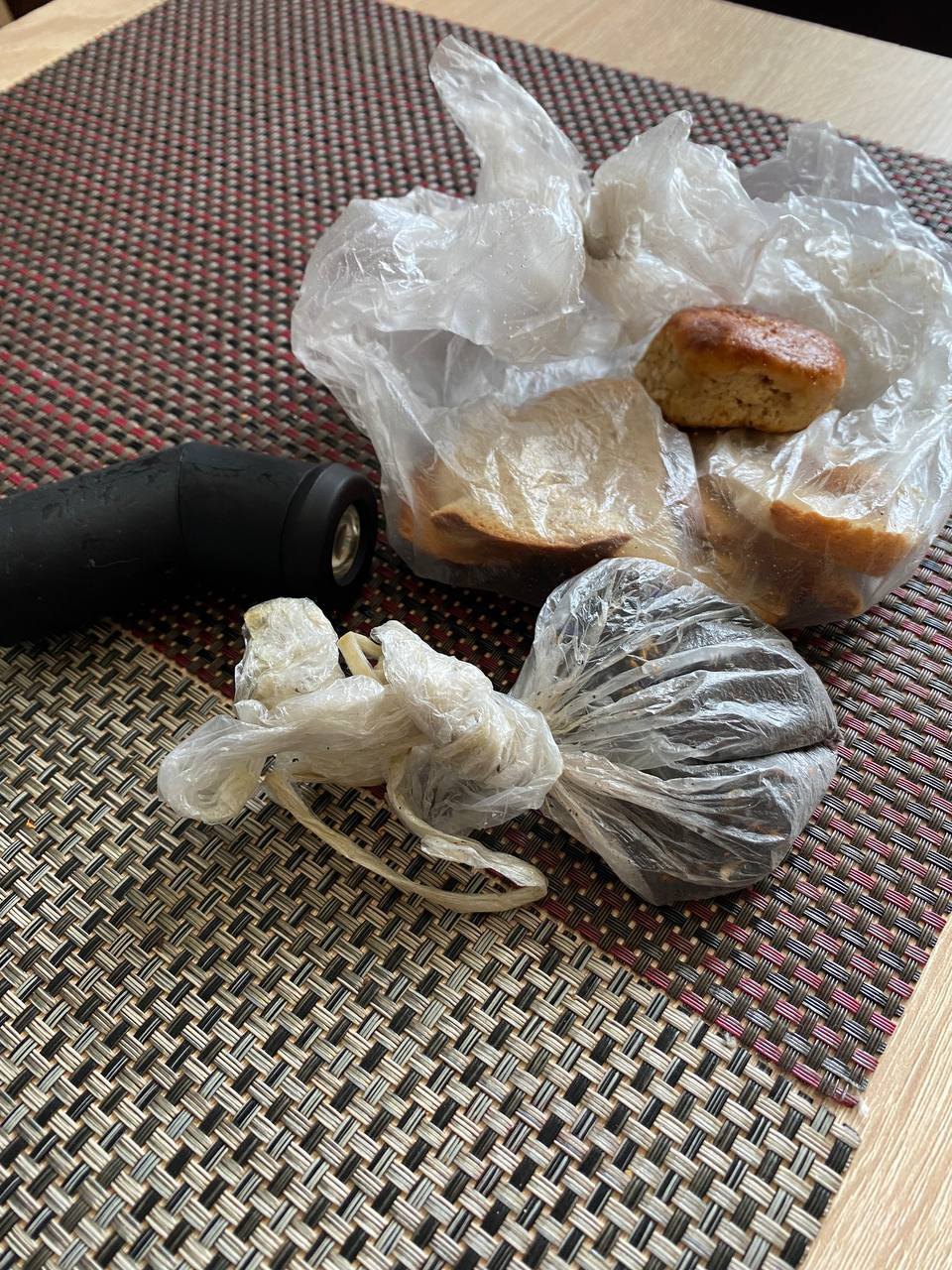
At this challenging time, people behaved differently. The police had gone somewhere, the military could not oversee everything, and mass looting began in the city. And this was done by locals. They smashed grocery stores and shops with clothes and household appliances. There is no single store left in the city center that has not been robbed.
Someone smashed a shop window, and some people seemed to become crazy: they were pulling refrigerators and washing machines. One approached the neighbor and asked: “Do you not need a washing machine?” She lost the ability to speak for a moment and then replied: “Why would I need a washing machine if I have no water or light, and soon maybe there will be no home for me.”
Another example is a teacher with a new children’s backpack behind her back and a broom. I asked her why people would rob in the city where they live. She answers me: “How can they?” And she is standing with a backpack and a broom she just stole.
A letter to the son
Karyna: Around March 2, my phone was completely discharged. Until then, I saved the battery to send my son Oleksiy text messages that we are alive and tell him our situation. Then I wrote a message but could not send it. I asked people to send my message, but they had the same problem. Then we decided to write a message on a piece of paper and pass it on to those who tried to leave Mariupol. I begged everyone to send this letter.
Then we asked people to pass the letter to three people: Oleksiy, his friend who lives in Ternopil, and Yulia’s son so that at least one of them could send information to others that we were alive.
The letter was delivered only on March 15, after the first people managed to leave Mariupol.
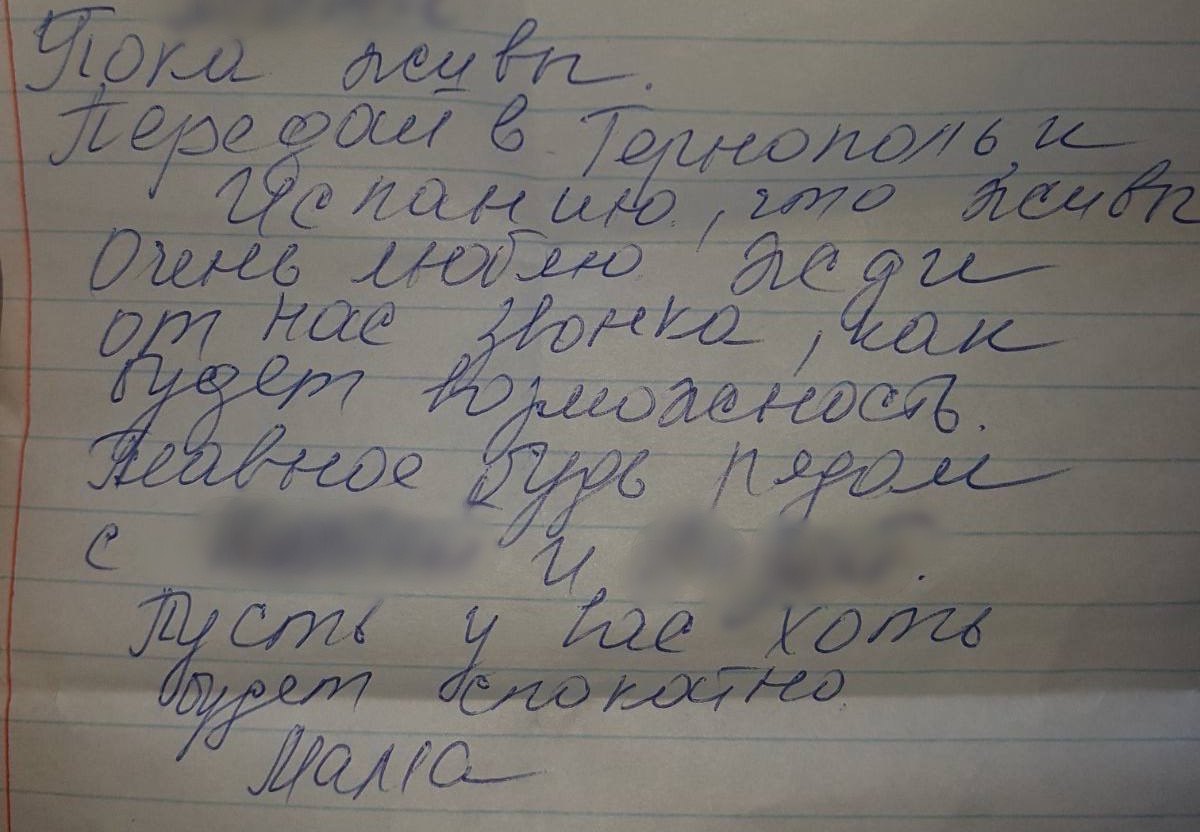
New shelter
Карина: For about two weeks, we lived in our apartment, cooking on the fire, melting snow to get water, and hiding in the corridor. But everything changed dramatically on March 17. Before that, intense street fights began. We have heard that armored vehicles have worked in the city for several days. Our tank was hit somewhere, and it was parked in our yard. On March 17, it was fully destroyed – all our windows were smashed. Yulia and I went out on the stairwell, and there was a guy with a stick. I asked: “How are you?” And he said to me: “I have nothing left of the apartment. There are not even door arcs. My apartment is completely erased.”
We went outside and saw people with suitcases running away from their houses. We started asking them where they were going. It turned out that the military told them to go to Kuinji Street.
To be honest, we didn’t believe until the last minute that our district would be taken into the ring; we tried to stay at home until the last minute.
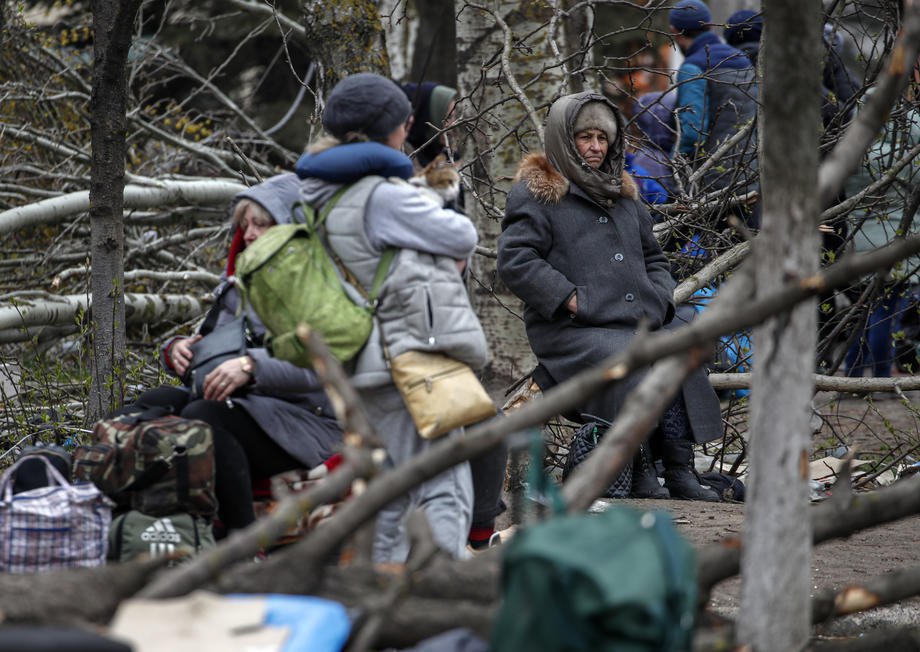
We understood that we had to do the same as everyone else – run away. We took food, water, warm clothes, and documents. We gathered very quickly. My mother cried; she did not want to leave the apartment.
We had to walk through the yards, past several houses, to avoid getting into the meat grinder, which started on the main street. We had an alley and access to the open area, but everything was on fire, and there was a shooting.
Yulia and I carried warm clothes. My husband pulled his parents. When they went out, his father’s legs were paralyzed. I tried to stop the cars so that someone could drive us to Kuinji Street. But all the cars were overcrowded. Another woman was carrying her father in a cart from the supermarket.
At that moment, Russian planes appeared in the sky and began the bombing. I saw an embankment near the road. It was made so that the tanks would not pass. We threw our parents onto this barrier and backed them up. It was very scary. I begged them: “Let’s walk a few meters to a building.” And yet we reached the fourteenth-story building, where the DTEK office was on the ground floor.
Yulia went further and found us the first shelter. It was the first house that was damaged on Kuinji Street. A missile hit it, so there was a huge hole in the center of the house. Locals allowed us to enter. My father and I stayed outside because we couldn’t pull him into the basement: we lay down near the tires used to make flower beds in the yard. It didn’t make sense to stay there for a long time, so we went from entrance to entrance, looking for some stable shelter.
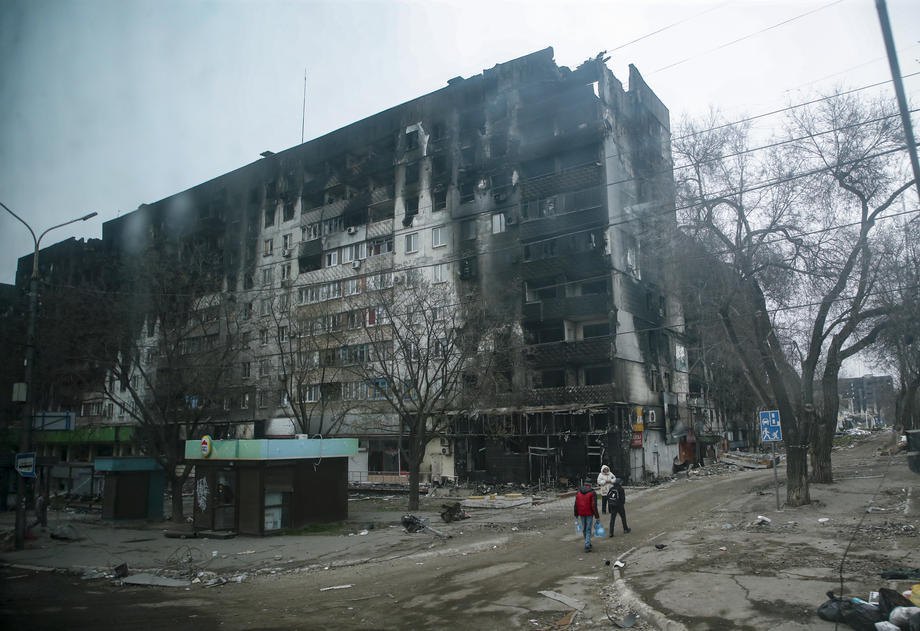
There was a house number 96 across the road. Under bombardment and gunfire, Yulia and I ran to it. We saw that there was a better basement, we left our belongings there, went back to our parents, and moved them in. We spent the next three days there.
“We divided a glass of hot water a day for six people”
Karyna: We went down to this basement, and Yulia found an acquaintance – another woman from Sartana. The Sartan Brotherhood helped us. We were given a place, and a bed was made for our parents from boards and broken doors. My husband, Yulia, and I were sitting on chairs. The basement was damp, dirty, and dark. And we were sitting there, crying and not knowing what to do next.
There were a lot of people there. Some – from the first days of the war, they have already managed to arrange separate rooms. When we moved, we lost food. Only crackers remained. Thanks to these people from Sartana, we received food and water. I don’t know where they got that water, but they gave us a glass of hot water every day. And we shared it among six people. We were also given a bowl of soup. There was a loaf of bread and a piece of cheese, and I don’t even know from where. But we did not want to eat.
My father’s health has deteriorated. Before the war, he had a stroke, then he contracted the coronavirus, and this darkness and constant explosions, of course, worsened the situation. He rapidly began to develop dementia with all its consequences. My husband somehow restrained him. It was very uncomfortable in front of other people who lived in this basement. We tried to explain the situation to them. This was not our house.
The next day, this house was hit by a tank or “grad”, we don’t know for sure – it caught fire. The men organized themselves, took the keys from the people, and rushed to put out the fires with rags so that the smoke would not get into the basement.
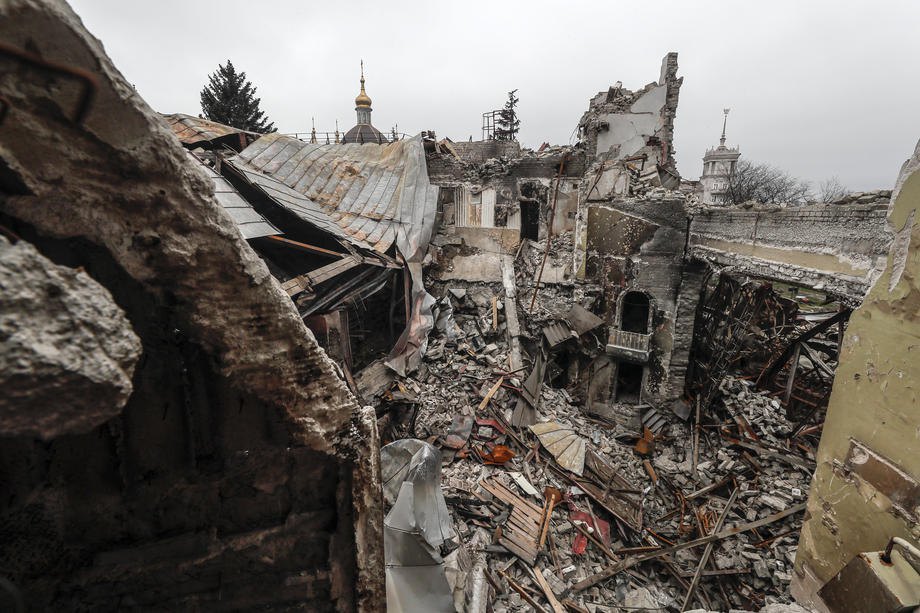
Then house #94 was hit, and its residents, some with children, came to seek shelter in our basement. But they were not allowed; there was no place. Only children were permitted.
On the morning of the fourth day, the first floors went on fire: the smoke went into the basement, and we began to suffocate. We managed to pull grandma and grandpa out, but we left most of our stuff.
Outside we saw a picture, as in Stalingrad: houses destroyed; shells explode everywhere; funnels of different diameters around - from small, half a meter, to those that can accommodate a large truck. And we took short runs to get to the house across the road - it had the only open entrance in the neighborhood. We also stayed in it for three days.
“I saw from the window how the house where I lived all my life was destroyed”
Karyna: We were sheltered by young people who cared about us in this house: Liosha and Lena. We thank them very much. In this house, they are the only ones who received and helped us.
They brought food, and they did not mind sharing a glass of water with us. Everything they cooked for themselves, they also cooked for us. The problem was that this high-rise building had such a basement that one needed to move as a crayfish to go down, so we spent the first day right on the staircase.
Yulia’s mother was placed in an auxiliary room used for children’s strollers, and the five of us sat by the elevator. Later one man allowed us to sit down in a partition [a corridor between apartments - LB.ua]. There was a very strong draft because his apartment had no windows or doors.
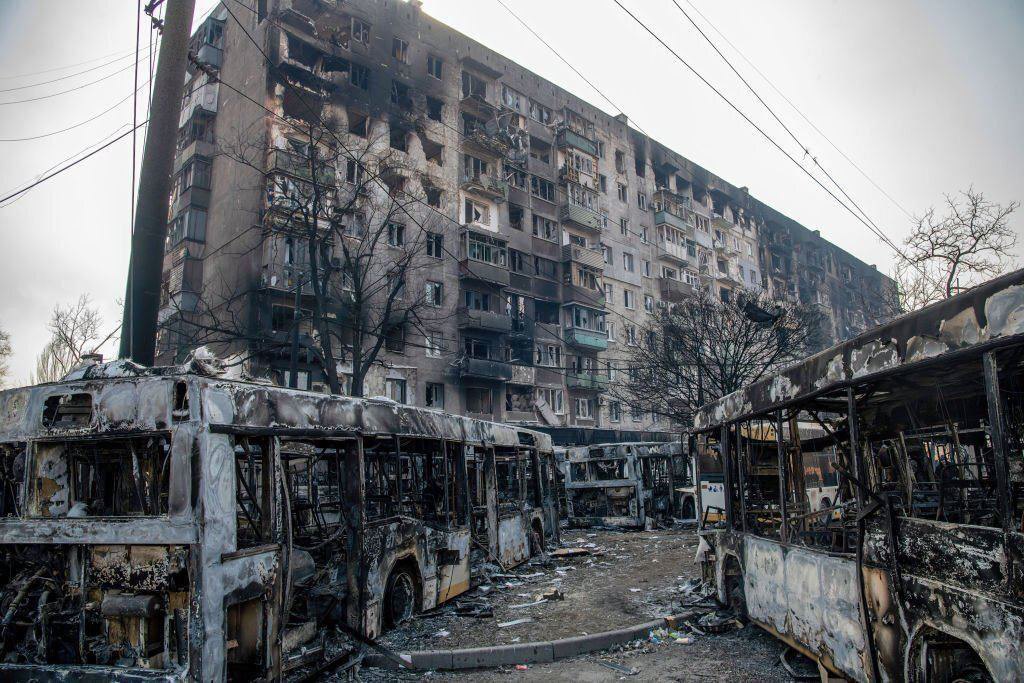
Surprisingly, they didn’t hit us that night, but the Russians started bombing us even harder than before. The windows of this house looked at my home. Sometime in the afternoon, it began to burn. First the ninth floor, then the eighth. Good that it was not the first floor, I thought to myself. Then the fifth and sixth on my part of the building. And then the russians just started ruining these houses. If something was not burned, they shot there. If the whole window was there by some miracle, they would destroy it. So I saw from the window how the house where I had lived all my life was destroyed.
Then the owner of the apartment where we were hiding pulled a black awning on the windows. I don’t know where he found it. I sometimes asked him to see what was happening with my house. But it was impossible to see anything. Everything was in smoke. I couldn’t even figure out exactly where my house was. So we continued sitting until our soldiers came and told everyone to go down to the basement.
And there was not a basement, but more like a heating main. People laid mattresses on the pipes. They cooked food on the fire and did not even go outside, so everything was in soot. They had a stock of water and cereals. Apparently, when the products were pulled away from the nearby Silpo, some of them were brought here.
These people did not let anyone in, but the military came, and they agreed to let women and children get in. I stayed with my father and husband in the corridor.

Russians came
Karyna: In the evening, a woman from the next entrance came to us. Her house was on fire. In order not to get burned, she came to us. I don’t remember why, but we talked and laughed all night. I didn’t even want to sleep. I just choked on laughter.
We locked the front door at night. In the morning, they rumbled the door loudly. The man opened it - the russians came. They said to raise our hands slowly and open all the doors. They started checking the documents. They ordered me to go down to that basement. When everyone left, one said to me: “And you, woman, stay here.”
I was very scared: “Why do they need me?” I stood near the basement. “Now we will go to the apartments, do the “cleaning”, and you will open the doors.” Apparently, they wanted to use me as a living shield. I tell them: “Open the door how you want, but I will not go with you. Can I go to the basement?” And they let me go.
They also asked me if there were any military. And how do I know what I should say in such cases and what better not? I said that I didn’t know. I decided that it was better to keep quiet and pretend stupid so that they get away.
The russians did not allow us to leave this basement. A convoy person oversaw us. It was a young man from Donetsk; his name was Andriy. He told us that he would shoot us if we tried to get out.
We peed into the jar. We managed to agree with him to go to the other place for greater needs. First, we did it near the elevators, then in the broken apartment on the ground floor. But to get to such toilets, one had to be very fast because there were no windows or walls in that apartment. And fights continued on the streets. Nobody wanted to be shot. So we mostly pooped in the garbage bags, then threw them away.
This convoy had gone somewhere the next day, and our military arrived. But we realized that we definitely had to get out of there because that house might completely collapse after a couple more blows.

Evacuation
Karyna: It was already March 24, and we started going out. And there were no more roads in the city - only a mix of trees, the remains of houses, burned equipment, and glass. We approached the military and asked where we needed to go to get out of town. They said they would cover us. Another family decided to leave the house from the next door entrance. They used to live on the ninth floor. They went down to the eighth floor to eat. And at the same time, the missile arrived and completely destroyed the stairwell. Luckily, the houses shared the wall. They made a hole in the wall, moved to another house, and managed to go down to the basement. And then there was the arrival to that basement. They were lucky to survive. They even managed to save the dog.
Yulia: We were shown where to go, but we had to cross the road where the fighting was going. It took us five attempts to do that. We just get to the road - boom-boom, explosions nearby. On the third attempt, we reached the burned house. We literally dragged our parents. We reached a certain point, and I saw smoke, shooting. Part of the street was visible, but another part was not. We went back again.
Everything around is burning. Well, we could go further. But it could be even worse there. We started arguing, deciding who would take responsibility and lead everyone. We decided to move towards the Novoselivka district [between Metallurg and Budivelnykiv avenues - LB.ua]. We asked people around where they came from and where they went to find out where it was more or less safe.

The bypass ways led us to the russian-controlled territory. There were no shellings at that time. We met people. “Go to hospital #17,” they advised; it was supposedly safe there. On our way, we met a doctor. He said he had done surgeries for the past 14 days and just went home. Then we met a nurse, and she also sent us to the 17th hospital or Novoselivka. People were supposedly taken out from there.
Karyna: Moving was very difficult. Our parents took two steps and sat down; another two steps and sat down. Then I lost my strength. I normally walk with a stick, but at that time, I ran. Usually, this trip would take 40 minutes, but it took us 3-4 hours.
There was already a lot of equipment around with the Latin letter “Z”. We turned away when they passed by us so that they would not shoot us.
There, too, shooting continued, planes flew, explosions were heard, but people walked calmly. I was shocked to see an acquaintance woman with makeup on her lips. I pulled a hat over my face to not be recognized. Because we were completely dirty, my leg started to fester. We could not wash our hands of soot. I was wearing seven warm jackets, a dressing gown, a warm lining, and a jacket. I put on scarves, and I still had a hat on my head, which constantly went on my nose.
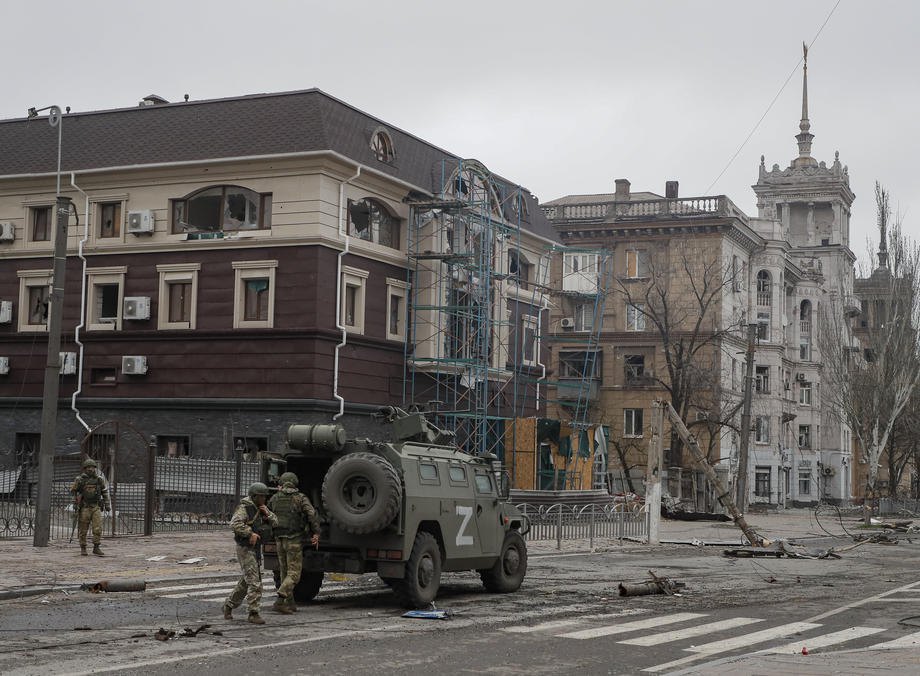
Yulia wore three jackets and two pairs of pants. My mother was in her robe, husband’s jacket, and boots.
Yulia: Our mucous membranes were damaged because we were breathing smoke. My mother still has some rashes, and Karyna’s hand skin still crawls.
In Novoselivka, I decided to leave everyone and went to conduct my reconnaissance. I saw a car with a red cross. I approached the driver and asked: “We just came from the basement. We have three elderly. Take us away, please.” He said that he would take us to Zaporizhzhia via Volodarsk. And we realized that we could be saved.
I went back to our group and said we would be taken away.
Karyna: We approached the house where a volunteer was waiting for us. He distributed humanitarian aid. He had a minibus. In addition to us, he took several other people - 17 people in total. We passed about 80 checkpoints. One hundred meters passed - a checkpoint, another hundred meters passed - a checkpoint. We were stopped at each one. They checked documents. The driver was asked why he was wearing a bulletproof vest. And he said he had nothing to hide. They checked our phones, mostly of men. Someone didn’t want to let us pass but then let us go.
Yulia: Before Berdyansk and on the way from Berdyansk in the Zaporizhzhia region, there were only russian checkpoints. They spoke to us in Ukrainian at our checkpoint - and we exhaled.
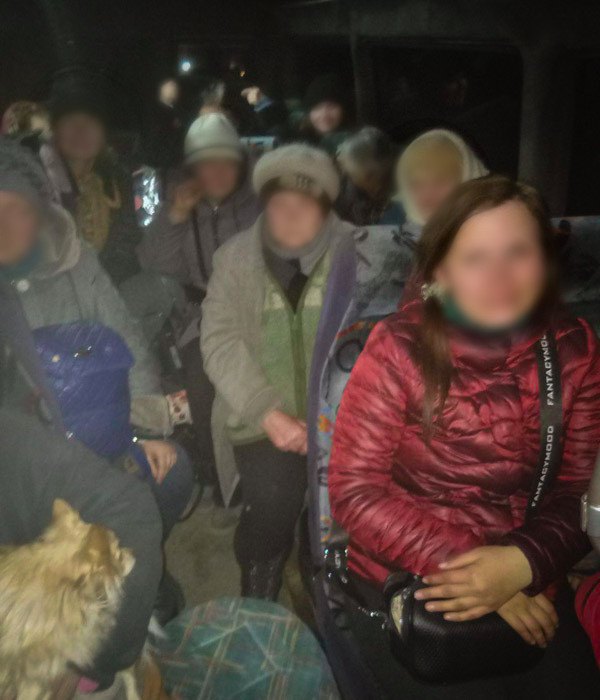
Acclimatization
Yulia: In the evening, we arrived in Zaporizhzhia, to a large center for migrants. They registered us there. There was a lot of food; we hadn’t seen that much in a long time. Eat if you want, and drink if you want. Clothes were given. A bus was waiting to take us to the accommodation.
We didn’t eat much because we didn’t really want to. We ate normally at the overnight stay location, but in the dark, because of light masking. We finally managed to take a shower there.
We were taken to the station in the morning, where we were led to a train, and we went to Karyna’s son, Oleksiy, in the Vinnytsia region.
Karyna: We were very well received in the Vinnytsia region. When I went to apply for help from the UN, I asked a man how to get to the administrative center and told him that I was from Mariupol. He took money from his wallet, everything he had, and gave it to me. I started crying over there.
I came to the place where they offered help and told the female workers that I was from Mariupol. And they were also from Mariupol.
We managed to find a job in the Vinnytsia region in a few days. We were very well received. We were impressed that we hadn’t even started working, but our future colleagues, who hadn’t yet seen us, have collected for us and donated money.
Although it is relatively quiet in the Vinnytsia region, there is tension and fear. People do not know what will happen next. If in 2014 everything worked here, there were no explosions and missile arrivals, now something works, and something does not.
I don’t sleep at night. First, this is not my home. I’m scared, even if a car with sirens passes. When I see sandbags under the windows and soldiers with weapons, I get hysterical and cry. When I was in the Vinnytsia region in 2015, people on the street were more cheerful and joyful. I am very grateful to the people who took my children out of Kyiv and those who helped us here and gave us a place to live.

I am grateful to those people who gave me clothes and food. Yesterday our grandmothers went outside to sit down, and the neighbors brought cucumbers, apples, and potatoes. I am very thankful to all.
Losses
Karyna: The number of five or ten thousand dead in Mariupol, which the city council gives, in my opinion, is much higher. There are casualties in every yard, and many children have died.
Near each house entrance, there is a grave where people have buried their loved ones. I had a friend who sold cosmetics and went to Mexico before the war. She could not find her parents for a long time. Only a few weeks later, she was able to call her sister. She learned from her that her father had died. There is not a single family in the city with no one died.
Yulia: Many people are buried near their own houses. And not even near houses. When we went outside, we saw crosses near the tram rails. All hand-made. Nobody took the corpses of soldiers or civilians anywhere.
A neighbor left the house, and 20 minutes later, there was an explosion. We don’t know if he got home. He was never found - neither alive nor dead. We have heard of mobile crematoria burning people to cover their traces, but fortunately, we have not seen it.

What’s next
Yulia: We probably won’t be able to live at home anymore, even if the city is liberated. I would want to go see what happened to my house and leave. Maybe take something as a souvenir.
If someone gives us money for reconstruction and Ukraine will do it, I am ready to return and participate in the reconstruction myself. Of course, I want to go home.
If it weren’t for the war, I would have lived in Sartan. I could go anywhere. My sister lives in Spain. But I can’t be abroad for long – I always return home to Ukraine. I have dogs there, Sharik and Tyson, and a cat Barcelona. I miss them very much, and I hope their people feed them. Our people treat animals better than russians treat people.
Karyna: I don’t want to live on people’s bones. I will not be able to return to Mariupol. There is nothing left. Now I don’t even have photos of my son – they all burned down. The whole story of my life remained there.
I can return if there is a reconstruction. But the question is which side will do it. I do not want to live in a country that is incomprehensible to me. I want to live in my Ukraine. I didn’t ask anyone to do what they did. They just left us with nothing. My parents are 76 and 82 years old, and I am 57; where can I bow my head? I’m not 16-18 years old to start life over. Unfortunately, I will soon have to bury my parents, but where shall I bury them?
Yulia: I want to believe that we will have the strength and allies will help us. To expel the russians from our land and for them to receive the punishment they deserve. I want Ukraine to be whole, as it was before 2014.
Karyna: When we were sitting in the basement, I did not understand why all of this had happened. Why do they destroy us? What do they want from us? What are those babies guilty of? I do not understand how one can shoot at civilians. What was the threat from us?
I don’t know how it will end. But I cursed the one who started it all and all his relatives. I want him to see his relatives and friends, if they have them, suffer, and he can do nothing. How all the wounded suffered. Like my neighbor, who was bleeding because a splinter hit him, but no one could help him.








